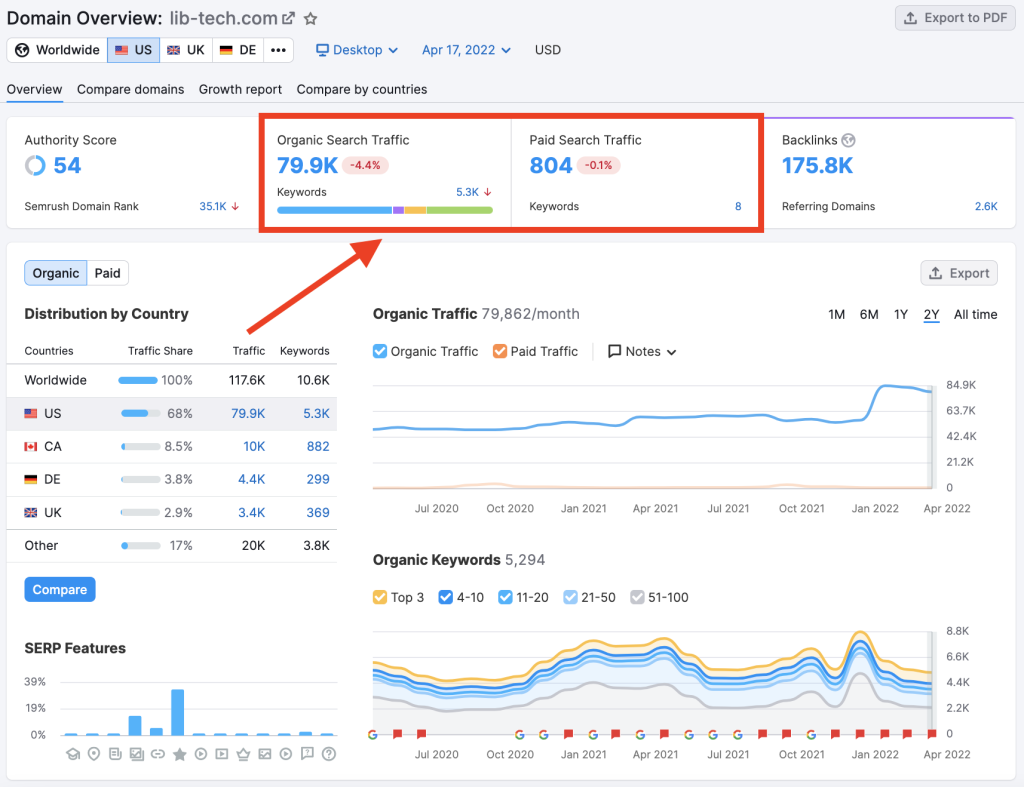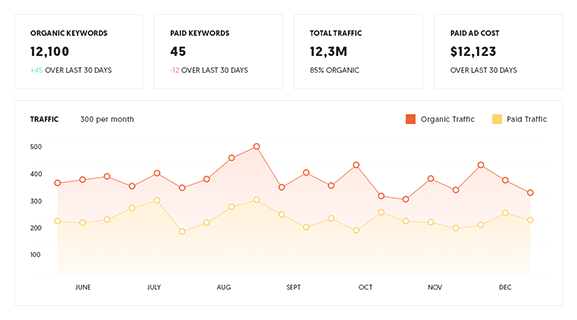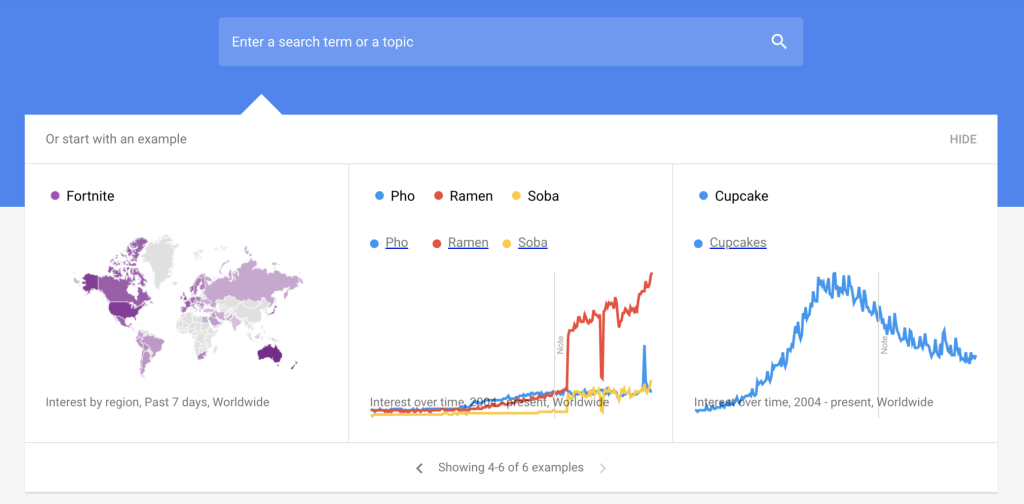Table of contents
With so much happening in the world of SEO and online marketing, it’s hard to keep track of all the latest trends and developments. One thing that’s been constantly changing over the past few years is keyword research, which has become more complex as search engines have continued to evolve.
Fortunately for us though this means there are more tools available than ever before for tracking down those elusive keywords we all want more traffic from! Below we’ve listed some of my favorite keyword research tools that will help you improve your rankings on Google while saving you time at work too:
SEMrush
SEMrush is a paid tool, but it offers many features for the money. You can get a free trial and see if SEMrush is right for your business before committing to a subscription.
The SEMrush keyword research tool allows you to search by industry or category, so you can quickly find keywords related to your niche that have high traffic volume and low competition. The site also provides suggestions based on other keywords in your list; this feature helps ensure that all possible options are considered when performing keyword research.

SEMrush comes with an extensive database of backlinks, including those from social media platforms like YouTube and Facebook as well as blogs and news sites; this information can be helpful when analyzing competitor sites’ link profiles or conducting outreach campaigns targeted at influencers who may be interested in writing about topics related to yours (or mentioning them).
Ubersuggest
Ubersuggest is a keyword suggestion tool that allows you to find keywords that have a high search volume. It can help you to find long tail keywords, which are keywords with low competition and more relevant to your business.
Ubersuggest is free and easy to use, but there are some limitations on their free plan such as their results only include 5 suggestions per query and they don’t show any metrics like search volume or difficulty score.
BuzzSumo
BuzzSumo is a great keyword research tool for finding content that’s getting a lot of shares. If you want to find the most shared content in your niche and see what other people are talking about, this is one of the best tools out there.
BuzzSumo allows you to search for specific keywords or URLs and discover the number of times they have been shared across social media channels like Facebook, Twitter, and LinkedIn. Additionally, it provides information on the publication frequency of each content piece, helping you identify new and potentially relevant topics to write about.
Google Keyword Planner
The Google Keyword Planner is a free keyword tool that helps you find new keyword ideas and estimate search traffic, impressions, and click-through rate. This tool is a good place to start your research because it provides a ton of information about your potential audience. For example, the planner will tell you how many people are searching for each term on Google every month and give suggestions for similar terms (which can help guide your next steps).

Keywordtool.io
Keywordtool.io is a free keyword research tool that users can utilize to generate keyword suggestions for a single keyword or group of keywords. It also enables you to obtain suggestions for specific countries.
You can enter your seed word(s) into the tool, then click “Get Ideas” to begin getting results. You’ll see some basic data about each suggestion including:
- Competition – How difficult it might be for your site to rank on Google (1 being easiest and 10 being hardest).
- Keyword Density – The percentage of how often this term appears on average across all websites vs just pages within their niche (0% being least dense).
- Monthly Search Volume – How many times people search for this term monthly worldwide over time (this figure represents global search volume).
Moz Keywords Explorer
Moz Keywords Explorer is a paid tool that offers an excellent combination of features as well as ease of use and value for money.
It’s not the cheapest keyword research tool on this list but it does offer some great functionality we can say Best Keyword Tools that you won’t find elsewhere – like the ability to quickly see which keywords are already ranking in Google.
Keyword Shitter
Keyword Shitter is a free keyword research tool that generates random keywords based on your main one. It’s a great way to find new ideas for your content, and it can also be used to find more specific variations of your main keyword.
For example, if you’re writing about dog training, the word “dog” might be too broad for people interested in training specific breeds or types of dogs (e.g., German Shepherds). However, using Keyword Shitter as part of your research process will help uncover more precise terms such as “German Shepherd puppy training” or “golden retriever puppy care.This can help narrow down the scope so that people who search only those terms will see exactly what they want when they come across one of those pages on Google or Bing!
Google Trends
Google Trends is a tool that lets you see how often a particular search term has been searched over time. It shows you the volume of searches for the term in different countries and languages.
You can also observe how often the term was searched compared to other terms, providing you with an idea about your target audience’s location and language preferences.
Conclusion
The best way to know what your audience wants is to ask them. A good place to start is with a survey and then using tools like Google Trends and Google Keyword Planner to find out more about the search patterns of your customers.
Read About: 5 Tips to Energetic Keyword Placing (DKI)
Readmore : SEO for Startups: Budget-Friendly Techniques to Gain Traction in Search Rankings
FAQ’s
There are many ways to do keyword research for free in 2023. Here are a few:
Google Trends – This tool allows you to see the popularity of a keyword over time and across different regions.
Google Keyword Planner, while primarily designed for advertising, also facilitates keyword research by displaying related keywords to your query along with their search volume.
Answer the Public – This tool shows you the questions people are asking about the keyword you’re searching, which is useful in creating content that provides answers to those questions.
Reddit – Find relevant subreddits to your keyword and read through those threads. From there, you can gather what questions people are asking and the vernacular they use on a particular topic.
Here are the nine types of keywords in SEO that you need to know to convert:
Branded keywords
Product keywords
Competitor keywords
Industry keywords
Geo-targeted keywords
Short-tail keywords
Long-tail keywords
Latent Semantic Indexing (LSI) keywords
Intent-based keywords
There is no one-size-fits-all answer to this question, as the accuracy of a keyword tool can vary depending on several factors like location, search volume, & specialty. However, many SEO professionals consider Ahrefs, SEMrush, Google Keyword Planner, and Moz as reliable and well-known keyword research tools.






